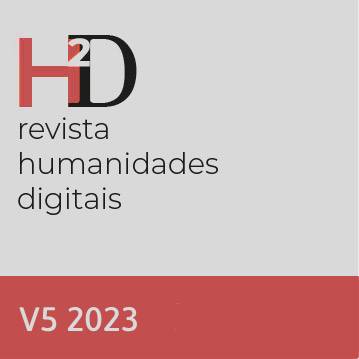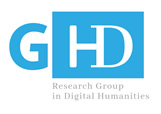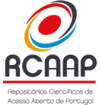Caminhando para uma Ciência Aberta: Uma abordagem estatística a partir da criação de resumos extrativos manuais e automáticos
DOI:
https://doi.org/10.21814/h2d.4479Palavras-chave:
automatização, ciência aberta, ciência de dados, corpus, democratização de dados, resumos extrativosResumo
Nos dias de hoje, a difusão de novos meios facilitou a proliferação de dados científicos, que podem ser divulgados graças a novas técnicas de tratamento da informação. Visa-se, neste artigo, a partir do fluxo de trabalho que se estabelece entre dados abertos e ciência de dados, analisar resumos gerados de forma manual e de forma automática em termos estatísticos. Assim, avaliam-se novas possibilidades de tornar o conhecimento científico mais acessível ao caminharmos para uma democracia de dados. Desta forma, tomando um corpus de textos resumidos como ponto de partida, realizar-se-ão análises quantitativas com recurso a fundamentos teóricos que permitirão retirar conclusões relativamente à viabilidade da automatização para atingirmos uma ciência aberta.
Downloads
Referências
Atkins, S., Clear, J., & Ostler, N. (1992). Corpus Design Criteria. Literary and Linguistic Computing, 7(1),1-16. DOI: https://doi.org/10.1093/llc/7.1.1
Batarseh, F. A., & Yang, R. (2020). Data Democracy. At the nexus of artificial intelligence, software development, and knowledge engineering. Elsevier Academic Press.
Bird, S., Klein, E., & Loper, E. (2009). Natural Language Processing with Python. O’Relly.
Cavique, L. (2014). Big data e data science. Boletim da APDIO, 51, 11-14. http://hdl.handle.net/10400.2/3918
Cheng, J., & Lapata, M. (2016). Neural summarization by extracting sentences and words. Proceedings of the Association for Computational Linguistics (ACL), 484-494. DOI: https://doi.org/10.18653/v1/P16-1046
Davenport, T. H., & Patil, D. J. (2012). Data Scientist: The Sexiest Job of the 21st Century. Harvard Business Review. https://hbr.org/2012/10/data-scientist-the-sexiest-job-of-the-21st-century
European Comission (2016). Open Innovation. Open Science. Open to the World: A Vision for Europe. Publications Office of the European Union. https://data.europa.eu/doi/10.2777/552370
Hartley, J. (2016). Is time up for the Flesch measure of reading ease? Scientometrics, 107(3), 1523-1526. DOI: https://doi.org/10.1007/s11192-016-1920-7
Layton, R. (2015). Learning Data Mining with Python. Packt Publishing.
Lloret, E. (2021). Enfoques y retos para la generación automática de resúmenes. Archiletras Científica, 6, 87-103.
Masuzzo, P. (2017). Do You Speak Open Science? Resources and Tips to Learn the Language. PeerJ Prints. https://doi.org/10.7287/peerj.preprints.2689v1 DOI: https://doi.org/10.7287/peerj.preprints.2689
Mitchell, D. (2015). Type-token models: a comparative study. Journal of Quantitative Linguistics, 22(1), 1-21. https://doi.org/10.1080/09296174.2014.974456 DOI: https://doi.org/10.1080/09296174.2014.974456
Mirowski, P. (2018). The future(s) of open science. Social Studies of Science, 48(2), 171-203. https://doi.org/10.1177/0306312718772086 DOI: https://doi.org/10.1177/0306312718772086
Newman, R., Chang, V., Walters, R. J., & Wills, G. B. (2016). Web 2.0. The past and the future. International Journal of Information Management, 36, 591-598. http://dx.doi.org/10.1016/j.ijinfomgt.2016.03.010 DOI: https://doi.org/10.1016/j.ijinfomgt.2016.03.010
Provost, F., & Fawcett, T. (2013). Data Science and its Relationship to Big Data and Data-Driven Decision Making. Big Data, 1(1), 51-59. https://doi.org/10.1089/big.2013.1508 DOI: https://doi.org/10.1089/big.2013.1508
Ribeiro, C., Rodrigues, E., Matos, M. E., & Saraiva, R. (2010). Os Repositórios de Dados Científicos: Estado da Arte. Projeto RCAAP. D24 – Relatório. https://hdl.handle.net/10216/23806
Svensson, P. (2010). The Landscape of Digital Humanities. Digital Humanities Quarterly, 4(1).
Van der Aalst, W. (2016). Process Mining. Springer-Verlag. DOI: https://doi.org/10.1007/978-3-662-49851-4
Van Dijk, T. A. (1979). Recalling and summarizing complex discourse. Em W. Burghardt & K. Hoker (eds.), Text processing (pp. 49-118). De Gruyter. DOI: https://doi.org/10.1515/9783110837537-004
Wright, S. E., & Budin, G. (1997). Handbook of Terminology Management. Volume I: Basic Aspects ofTerminology Management. John Benjamins. DOI: https://doi.org/10.1075/z.htm1
Zhao, B. (2017). Web scraping. Em L. A. Schintler, & C. L. McNeely (eds.), Encyclopedia of Big Data (pp. 1-3). Springer International Publishing. DOI: https://doi.org/10.1007/978-3-319-32001-4_483-1
Publicado
Como Citar
Edição
Secção
Licença
Direitos de Autor (c) 2024 Ivan Arias Arias, Margarida Oliveira Ramos de Castro

Este trabalho encontra-se publicado com a Licença Internacional Creative Commons Atribuição 4.0.






